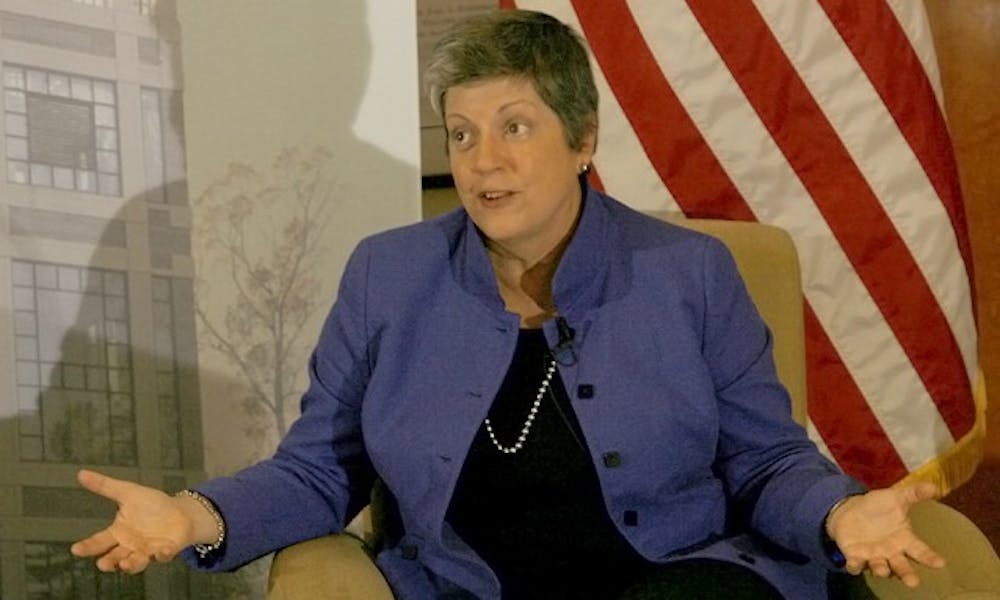The United States’ immigration system must undergo serious reform in the next few years, Secretary of Homeland Security Janet Napolitano said.
Napolitano, the former governor of Arizona, spoke to an overflow crowd at the Sanford School of Public Policy Thursday evening. She highlighted current security issues facing the nation and the steps the United States has taken to mitigate them. The event was part of the Terry Sanford Distinguished Lecture Series.
“Over the next few years, over the long term, we are going to have to address our immigration dilemma so that the economy can grow,” Napolitano said. “That’s going to have to be part of the solution to the economic hole we’ve dug ourselves in.”
Napolitano detailed the consequences of the DHS’ recent changes in deportation practices and border security. She noted that the DHS strives to prioritize the deportations of illegal immigrants who are also criminal offenders rather than productive residents.
“We have the resources to remove from the country around 400,000 people a year out of perhaps 10 million who are in the country illegally,” Napolitano said. “We’ve got to make decisions that are fair and that make sense.”
She added that she supported the federal DREAM Act, which would provide a path to citizenship for students who graduated from college or served in the military.
“There’s no stronger believer in the DREAM Act than I am,” Napolitano said. “If you can’t fix the overall immigration problem, let’s address those who were not culpable for being in the country illegally.”
In line with border security, the Obama administration created the Southwest Border Security Initiative in 2009 in order to reduce the flow of illegal drugs.
“From a southwest border perspective in particular, I’ve never seen it more secure than it is now,” she said. “We have coverage along the border. Our points of entry are very robust and facilitate the enormous amounts of commerce that need to go back and forth between... us and Mexico. It’s that combination of security and very robust land points of entry that... we want.”
Napolitano also noted issues prevalent on a global scale, adding that terrorism prevention is a shared responsibility between citizens and their governments.
“Shared responsibility underlies the philosophy of our government to begin with,” she said. “You don’t just hand it off to the government and wash your hands and say you’re done.”
Regarding profiling, excluding a group from screening may lead to higher terror threats, Napolitano said.
“The minute you say that you are not looking at certain categories, you can pretty much bet that that category will be exploited by our adversaries,” she said.
Changes to border reform and profiling practices are stalled in part by political gridlock in Congress.
The tense political climate is partially due to the government’s inability to solve big problems and Congress’s tendency to stray from its original intent, Napolitano said.
“Congress itself is a body that was built on the notion that reasonable people debating reasonably can reach reasonable compromises, and that no one has a monopoly on ideas,” Napolitano said. “Until we retreat—on a congressional level—to that original intent, we’re going to have problems. Congress, for whatever reason, is not capable of taking up a topic like [immigration] right now.”
Senior Shaoli Chaudhuri, co-president of Duke Students for Humane Borders, said the DHS does not always seem to enact immediate change.
“While we understand [Napolitano] doesn’t make the policy, we feel that the administration is playing a waiting game on comprehensive immigration reform,” Chaudhuri said.
Napolitano said she encourages Duke students to consider careers in public service.
“If you’re a student at Duke, you probably have lots of different types of roads that you can take, but the public service road is very fulfilling—it’s very challenging,” Napolitano said. “It demands the most of you intellectually; it demands a lot of your stamina; and it demands that you constantly be thinking about something that’s bigger than yourself.... That in the end is what public service is really about.”
Get The Chronicle straight to your inbox
Signup for our weekly newsletter. Cancel at any time.

